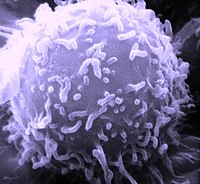
Photo from wikipedia
As placental mammals, the pregnant women and the fetus have intense and prolonged interactions during gestation. There is increasing evidence that multiple molecular as well as cellular components originating in… Click to show full abstract
As placental mammals, the pregnant women and the fetus have intense and prolonged interactions during gestation. There is increasing evidence that multiple molecular as well as cellular components originating in pregnant women are transferred to the fetus. The transfer of maternal antibodies has long been recognized as a central component of newborn immunity against pathogens. More recent studies indicate that inflammatory mediators, micronutrients, microbial products and maternal cells are transferred in utero and influence the fetal immune system. Together, these multiple signals are likely to form a complex network of interactions that program the neonatal immune system and tune its homeostatic regulation. Maternal disorders, in particular infectious diseases, modify these signals and may thereby alter immunity in early life. Understanding maternal programming of the newborn immune system could provide a basis for interventions promoting child health.
Journal Title: Seminars in Immunopathology
Year Published: 2017
Link to full text (if available)
Share on Social Media: Sign Up to like & get
recommendations!